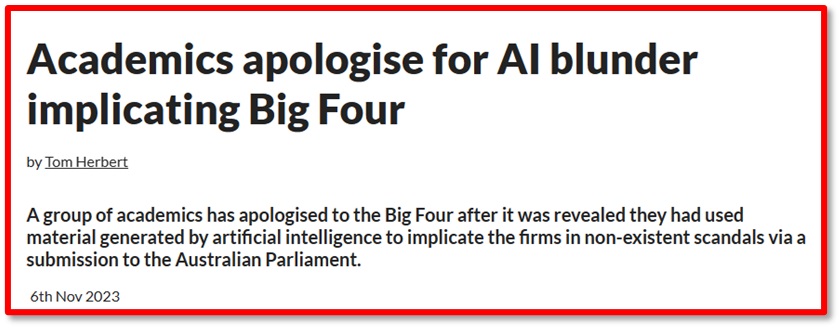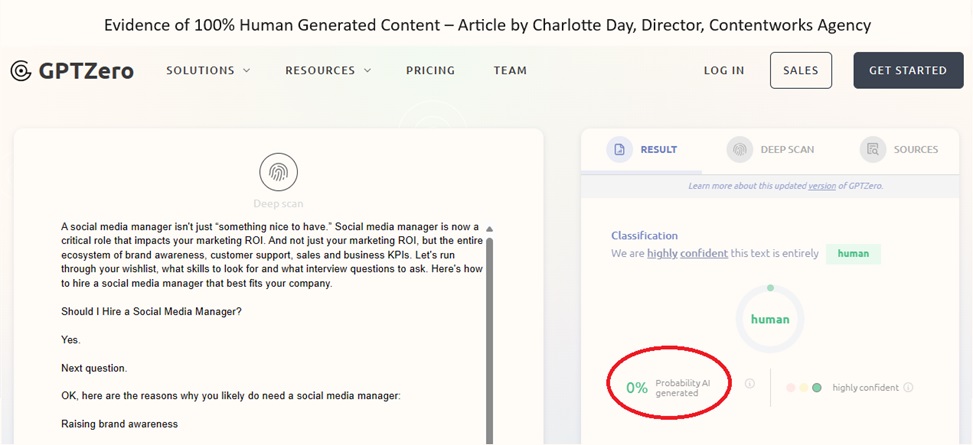
The following is a guest editorial by Charlotte Day, Creative Director at Contentworks Agency.
Google has announced plans to crack down on AI-generated content designed to boost search rankings by manipulating algorithms. It plans to remove AI-generated content from its search results and even target people who post low-quality content on sites with high reputation scores. The search giant explained that it will update the algorithms in its core ranking systems to target 3 types of “content abuse”, with automated AI-generated content at the top of the list.
So we can expect updates that help Google better identify websites that offer poor user experiences, aren’t useful, or appear to be built more for SEO than people. Google estimates that these updates will help reduce non-original search results and spam by 40%. The updates will also improve the identification of expired domains that are redefined as “clickbait sites”. Updates to Google’s algorithms are awaited released until May 2024will have a significant impact on improving the quality of online content and directing traffic to valuable and trusted websites. So how does Google recognize AI content and, more importantly, why should your finance brand care? Contentworks Agency is the leading content and communications company in the financial services industry. Here’s what’s happening.
Why is Google destroying AI content?
ChatGPT saw a million users within a month of its launch, largely because companies saw genetic AI as a quick and cheap way to create content, compared to hiring human writers. Besides, ChatGPT and the many others released since then have free versions. As a result, genetic AI has seen a huge increase in its use for SEO purposes. 76% of marketers use AI to create key content, and there are also AI tools that can optimize content for search engines, including introducing the most relevant keywords.
So why is Google cracking down on AI-generated content?
Accuracy of Information
Advances in NLP (natural language processing) help AI create blog posts, articles, and social media content that approximates human writing. This has led to concerns about the reliability and authenticity of online information. The proliferation of deepfakes has only deepened such concerns, with AI able to convincingly manipulate voices and faces, making it difficult to distinguish fake content from the real thing. Deepfakes are already used for phishing, but they have the potential for more damage, especially if they are used to spread false information. Statistics show that 86% of people worldwide have been exposed to fake news.
AI-generated fake news and disinformation are particularly harmful to the financial sector. Not only from a trust perspective, but also from a regulatory compliance perspective.
Manipulating search engines
Although Google works to determine the relevance and authority of websites to assign rankings in its SERPs, AI-generated content can sometimes slip. If AI is used to manipulate search rankings, users could not only be directed to low-quality websites but also to cybercriminals. This means genuine businesses will lose out unless they make the leap to AI. Even then, there is no certainty that high quality will beat the manipulation of technology-based SEO.
Self-dealing/Unethical use
In November 2023, a group of Australian academics admitted to using artificial intelligence to make false allegations against the ‘Big Four’ consultancy firms of serious wrongdoing, prompting the Australian parliament to launch an inquiry into the professional accountability and ethics of the consultancy industry.


Copyright infringement
In December 2023, The New York Times sued against Microsoft and OpenAI, claiming that their AI systems engaged in “large-scale copying”. AI systems are often trained on copyright material without the permission of the copyright holder. Additionally, genetic AI searches the internet for information to use in content creation, which can lead to copyright infringement. These are important concerns not only for SEO but also for reputation. Google can go so far as to blacklist websites that are found to be using duplicate content.
How Google identifies AI-generated content
Google analyzes a variety of elements to distinguish between AI-generated content and human-written content.
- Language quality: Google could check for semantic consistency, syntax and language patterns. Irrational flow and inconsistencies could be red flags for AI content.
- Context and source: Related information and references to trusted sources could indicate content written by humans. AI is known to struggle with language, contextual information and cultural references.
- Emotion: AI-generated content tends to lack personality, while human content can be differentiated by personal touches and unique insights.
- Boring: Dare we say AI content is boring? As content professionals we can quickly spot a webpage written with AI and we believe other savvy readers can too, which is reflected in the high bounce rates and low CTR. Of course, developments happen every day, but that’s where the landscape is right now.
- Repetition: Since AI is based on patterns and pre-programmed patterns, it tends to use standard or repetitive language.
- Metadata: Google already checks websites for their coding structures and metadata to identify automated content.
How will Google’s AI update affect your content?
You now have 2 months to perform a content review before Google releases its update. If your content either fails to meet the EEAT (Experience, Expertise, Authority and Trust) criteria or is flagged as AI-generated, you may face various consequences.
- Downgrade in search rankings: Since the search giant’s primary goal is to rank the highest quality content first, more relevant, lower quality and automated content will be demoted. This will make it difficult for your brand to be discovered online, as the search result at the top of the ranking generates a CTR of 39.8% as of 2023, while the second and third rankings generate a CTR of 18.7% and 10.2% respectively. Even worse, only 0.63% (less than 1% of searchers!) click on results on the second page of search results.
- Penalties: Not only will Google downgrade your content, it may also flag it as spam. Google strongly cracks down on low-quality, unoriginal content. So the consequences could be even worse. Your content may be removed from search results entirely.
- Impact on ads: If the content does not meet Google’s guidelines, your ad rank and overall performance may also be negatively affected.
So what should finance brands do with their content?
✔ In addition to Google penalties, funding brands also need to focus on regulatory guidelines. Despite the rapid development of artificial intelligence, including NLP and Large Language Models (LLM), it still cannot ensure compliance with the different regulations in different jurisdictions. Financial brands need to pay close attention to their content and imagery to ensure they are compliant.
✔ As AI evolves, Google will continue to improve its search algorithms to prioritize user experience and human content. Thus, following Google updates and incorporating SEO best practices will be key to ensuring higher search rankings.
✔ In addition to relevancy, Google prioritizes recent content to deliver search results. This makes it vital to update your content regularly. A content gap analysis could prove extremely useful for filling in your content with missing or deeper information. Update your sitemap to make sure it includes all the updated content. Contentworks Agency works with brokers to regularly add fresh and engaging content to their blogs, landing pages, social media pages, eBooks and white papers.
✔ Conducting a website audit is a great way to gain insight into the improvements needed to ace your SEO game. It will reveal broken links or images, redirects, loading speed issues, content quality, HTML tags and more. While there are online tools to conduct such audits, the most effective course of action is to employ the services of an experienced marketing team with expertise in the financial sector.


Contentworks Agency is the preferred content partner for leading stockbrokers, fintechs, banks and financial service providers worldwide. The team is experienced in strategizing and creating a wide range of content disciplines for the financial sector. We use anti-AI checkers like GPTZero pictured above to ensure our content is human-written and therefore SEO-friendly.
Make a free Zoom call with our team to arrange a site audit, human rewrite and Google friendly content.

